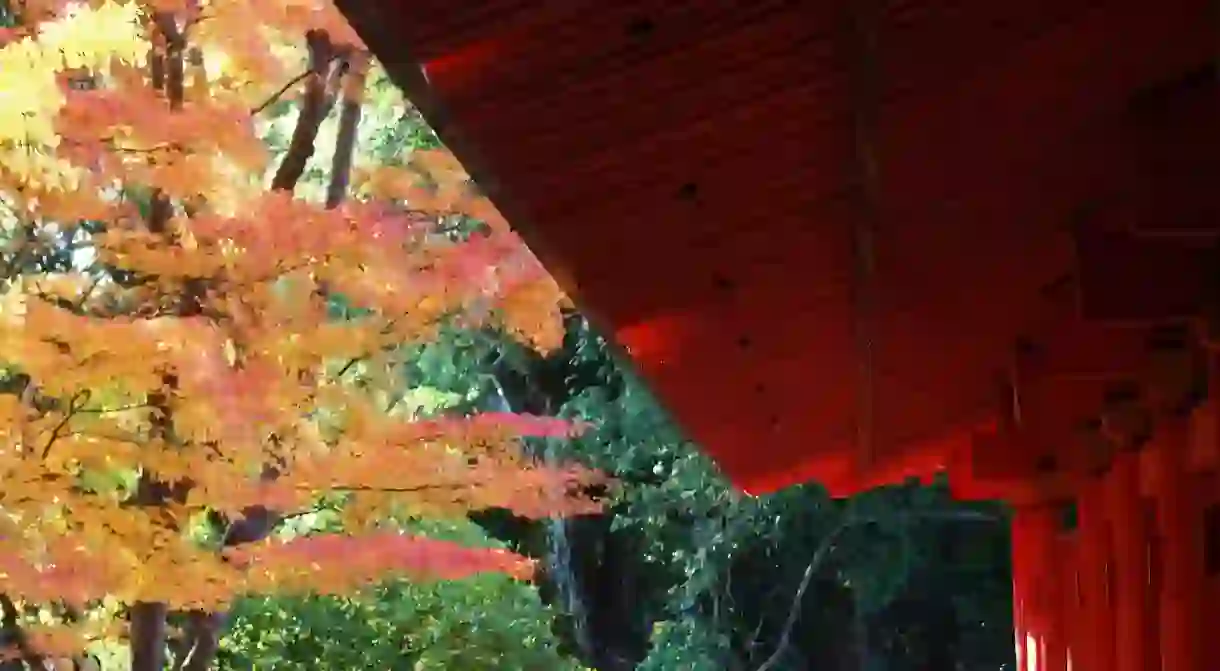8 Autumn Festivals to Celebrate in Japan

Japan knows how to throw a party, whatever the season. These eight autumn festivals from all across the country include wild street races, parades of historical costumes, and gourmet street food that will satisfy even the most critical connoisseur.
Kichijoji Autumn Festival, early September
The second weekend of September sees thousands of people flock from all ends of Tokyo to the neighborhood of Kichijoji. There, the Shinto shrine Musashino Hachimangu welcomes the coming autumn by carrying a mikoshi shrine through the town amid a boisterous street festival.

Kishiwada Danjiri Matsuri, mid-September
While danjiri matsuri, or float-pulling festivals, are celebrated all over the country, Osaka’s is considered the most high-octane of them all. Ornately carved wooden floats in the shape of shrines and temples are mounted on carts that are pulled by ropes through town. In the city of Kishiwada, Osaka, teams pull their danjiri carts as fast as possible, with a team leader standing on the roof of the float cheering them on while the cart careens dangerously down streets and around corners. Japan’s equivalent of the Pamplona’s Running of the Bulls, it’s an event that leads to numerous injuries per year and even the occasional casualty. Spectate at your own risk!

Sapporo Autumn Fest, through September
In Japan, autumn is said to be the season of hearty appetites, and there’s no better place to enjoy it than Sapporo City. Hokkaido’s biggest food festival hosts a range of gourmet items, including locally grown agricultural products, fresh-caught seafood, and delicious wine and sake. The festival has several themed venues, each with their own unique vibe, vendors, and dishes.

Nagasaki Kunchi Festival, early October
Nagasaki prefecture’s most famous festival, the Nagasaki Kunchi Festival, takes place around October 7–9 each year. The celebration incorporates a mixture of Dutch and Chinese traditions, as both countries had a huge cultural impact on the region going back to Japan’s early days of foreign trade. Look for colorful festival floats shaped like European ships and a frolicking performance of the “Ja Odori,” also known as the dragon or snake dance.

Hachiman Matsuri, early October
The mountain village of Takayama boasts one of the three most beautiful festivals in all of Japan, known as the Hachiman Matsuri. This autumn festival features gorgeous gilded floats that tower several stories above the crowd. The massive floats contain karakuri dolls, traditional puppets that are automated to act out a short scene, and are decorated with hundreds of paper lanterns.

Autumn Grand Festival, mid-October
Shuki Taisai, the Autumn Grand Festival, is the biggest festival in the Nikko area. Enjoy displays of marksmen shooting targets on horseback and a parade of 1,000 samurai warriors. The rituals offer a glimpse of 17th-century Japan and the traditional funeral rites conducted for Tokugawa Ieyasu, the first Shogun of Japan, who is enshrined at Nikko.

Jidai Matsuri and Kurama Fire Festival, late October
Jidai Matsuri, one of the three great festivals of Kyoto, is held on October 22 every year. A historical costume procession from the Kyoto Imperial Palace to Heian-jingu Shrine, the parade is an opportunity to see both local residents and geiko – Kyoto’s very own geisha – dressed in ancient garb from the 8th to the 20th centuries. After catching the costume parade during the day, hop on a train up to the nearby mountain village of Kurama for the excitement of the Kurama Fire Festival in the evening.

Kamiari Festival, November
All the gods are throwing a party and you’re invited, at the Kamiari Festival held at Izumo Grand Shrine. According to Shinto beliefs, all of Japan’s kami-sama, or deities, assemble at the shrine once a year, and people flock to Izumo during this time hoping that their prayers will be answered. The festival takes place from the 10–17th day of the 10th month based on the old lunar calendar, so the dates vary by year but usually fall in November.














